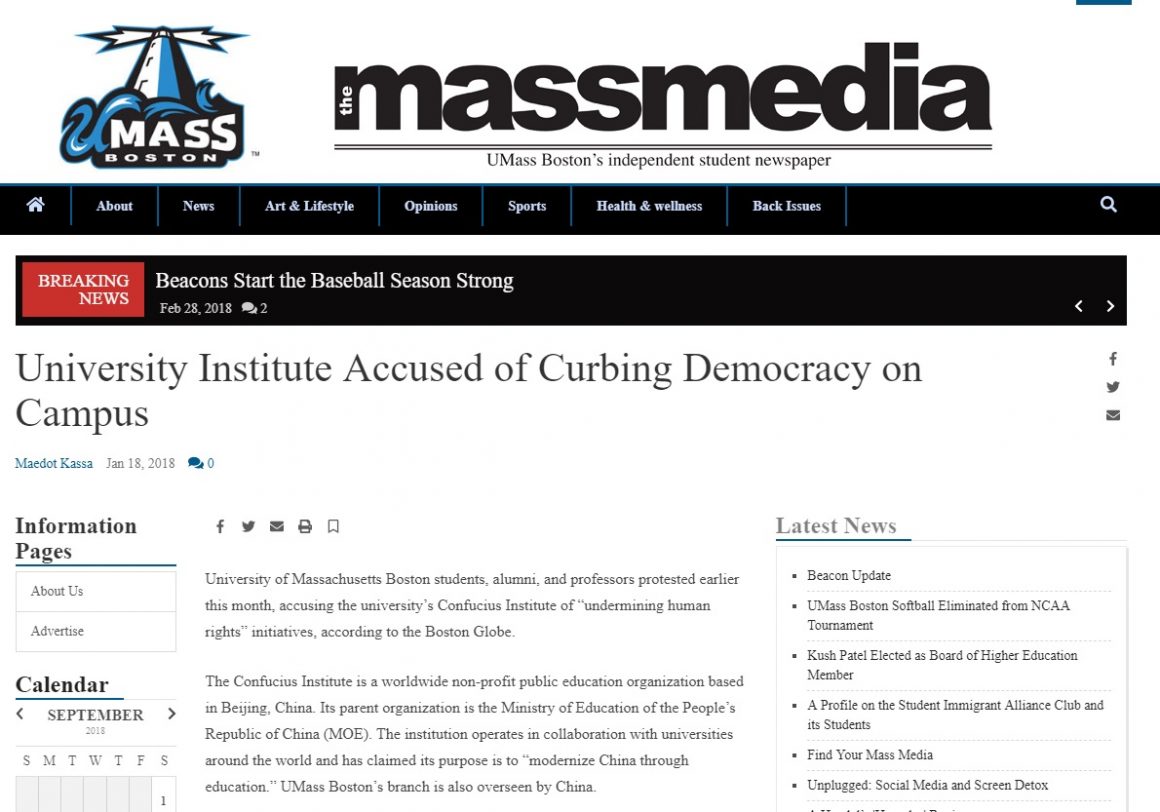University Institute Accused of Curbing Democracy on Campus
University of Massachusetts Boston students, alumni, and professors protested earlier this month, accusing the university’s Confucius Institute of “undermining human rights” initiatives, according to the Boston Globe.
The Confucius Institute is a worldwide non-profit public education organization based in Beijing, China. Its parent organization is the Ministry of Education of the People’s Republic of China (MOE). The institution operates in collaboration with universities around the world and has claimed its purpose is to “modernize China through education.” UMass Boston’s branch is also overseen by China.
Members of the protest, in a written letter to Interim Chancellor Barry Mills, claimed that the Confucius Institute was using their presence on campus to “influence and steer academic discourse.”
But, according to a University of Massachusetts spokesperson, the Confucius branch at UMass Boston has contributed to the diversity of the campus by providing Chinese languages and “cultural appreciation programs.”
The MOE operates more than 513 institutes worldwide and runs more than 90 Confucius institutes across the U.S. In addition to UMass Boston’s branch, according to The College Media Network (CMN), the MOE also has university-affiliated networks at the University of Maryland, William and Mary College, Michigan State, the University of Iowa, the University of Pittsburgh, and the University of California, Los Angeles (UCLA).
The institute does not only operate in universities across the country. The MOE also runs an additional 1,074 Confucius Classrooms in primary and secondary schools, including Brockton High School and the Cambridge Rindge and Latin High School.
“This is just one part of a very scary plan by the Chinese government,” Lhadon Tethong told the Globe. Tethong organized the campus protest against the Confucius Institute and is the director of the Tibetan Action Institute, an advocacy organization. “This is the beginning of a campaign to get that Confucius Institute closed,” he said.
“We think The Institute has filled the role envisioned…with the goal of advancing ‘the mutual understanding of language and culture,’” Bob Connolly, vice president for communications at University of Massachusetts, told the Globe.
Officials have neither denied nor confirmed whether the Confucius Institute is a threat on campus. Nevertheless, writers of the letter issued to Mills are pressing on the concern that democracy is not promoted on the urban campus: “As a result of their presence on campus, whether through direct intervention or pre-emptive self-censorship, important political and human rights issues are being silenced,” read the letter, which was signed by 17 people.
Those signatures included that of the president of the Boston Language Institute, the chair of the international board of directors of Students for a Free Tibet, and the director of the Lam Rim Buddhist Center.
As of yet, Mills has not directly responded to the letter.
The Confucius Institute at UMass Boston, according to the Globe, operated on a budget of approximately $500,000 and offered non-credit Chinese languages, culture classes, and grants for UMass students to study abroad in China.
In response to the protest, Gao Qing of the Confucius Institute in Washington, D.C. told the Globe in an email that the center is “dedicated to promoting mutual understanding.”
It is currently unclear whether the Confucius branch at UMass Boston is actually threatening democracy on campus.



